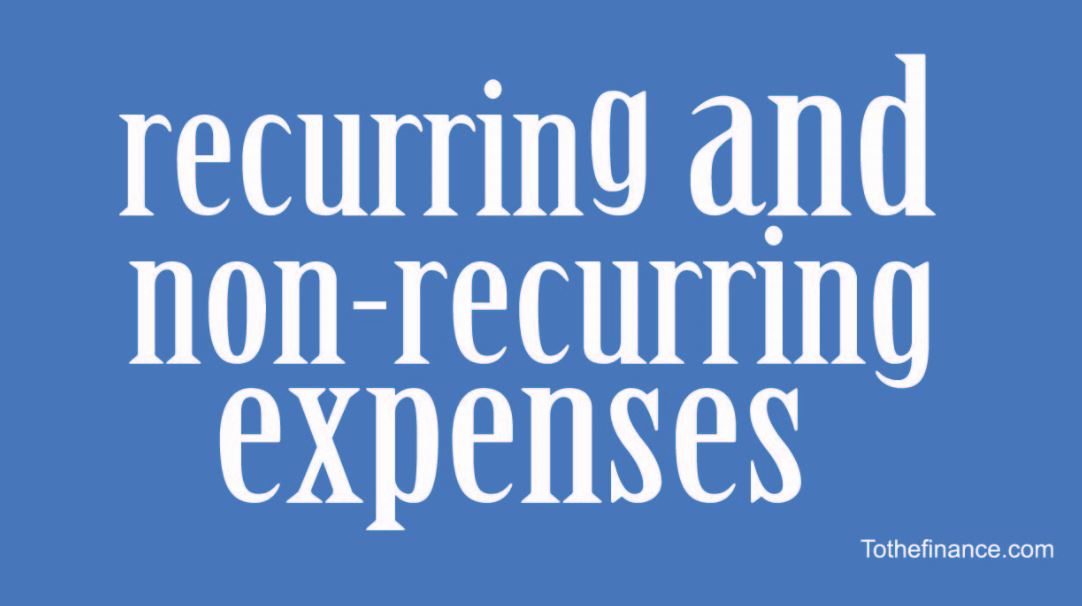What is meant by Recurring Expense?
Recurring expense is also known as recurring costs as the name suggests are repeating expenses. They are brought about as part of the usual and every day company mission. In order to make sure the profit along with the work of the company, these expenses come forward periodically with a proper plan.
As recurring expenses are usually expected and very predictable expenses the financial manger of the company has most of the times made a precise plan to run the business keeping in mind these expenses. These costs are kept safe in the company’s profit and loss account and are analyzed by the financial advisor of the business owner.
What is the example of recurring expense?
Recurring costs have a wide range of expenses which include; food allowance for employees, rents, salaries. Expense required for the promotion of the business which might include digital marketing or advertisement etc are a few examples. Expense that is utilized in the selling of the product such as the salaries of the transporter is also a major factor.
Also read, assets vs. expense
What is meant by Non-Recurring Expense?
Non-recurring expenses also known as non repeating expenses as the name suggests are those which emerge out of the plan and might be a burden for the businesses that are not well established or are not financially stable yet. They are brought about on special instances and events. They are unexpected so they might end up destroying the entire financial plan of the business. They are mostly infrequent and usually do not reoccur.
What are the examples of non-recurring expenses? What can lead to non-recurring expenses?
Non-recurring expenses might occur due to the following purposes:
Unusual happenings or disasters such as an earthquake, tsunami or flood can lead to the destruction of the buildings and offices. The cost required in repairing and fulfilling the loss will be considered a non-recurring expense.
Shutting down or starting up a business or in fact, a branch of the same business may also end up in a non-recurring expense. The reason behind this is that the shutting down expense, cost for expanding the area, investing in advance technology and hardware and so on would turn out to be a burden on the company’s profit account.
How are recurring expense and non-recurring differ from each other?
Following are several differences between recurring and non-recurring expenses:
Occurrence
Recurring costs are incurred frequently. They are brought about periodically according to the economic plan of the company. Such as bills, rents and salaries are compulsory to be paid and are expected expense.
Non-recurring expenses are infrequent and may occur rarely. They can include loss due to several disasters and unwanted tragedies, the expense required to compensate for the loss is considered to be non-recurring expenses.
Result from
Recurring costs are incurred periodically with a constant rhythm so that the everyday business activities can be carried out.
Non-recurring costs can be because of the expenses that are required for construction of building, new offices, improving the furniture etc. The damage done due to the any crisis is also termed as non-recurring expense. As we have seen that due to covid-19, business all around the world faced a decline in their progress, and had to face severe crisis. The loss that has been observed by the companies is considered to be non-recurring expense.
How can we distinguish between recurring and non-recurring revenue?
Recurring revenue is an essential part of the businesses especially for those that are established on subscription. In these businesses, the buyers have to buy a service on regular terms. This helps out the business to estimate and predict the incoming profits much more precisely.
Non-recurring revenue means one time purchasing that might not occur again. For example, if a company is arranging a concert and 600 people purchase the pass, this profit is single time which means that after the concert is ended people won’t buy the tickets, and the concert might not be arranged the next year. Thus, the profit earned is not repeating.
Advantages of recurring revenue
- Recurring revenue is expected. Customers that are currently purchasing your products are expected to stay as your loyal customers and increase your sales in time ahead.
- In recurring revenue, there are better, secure and strong metrics that makes it effortless to estimate the business worth in several ways.
- As you are offering standard instead of time, your buyers are more likely to do the same for you.
Advantages of non-recurring revenue
- As it is a single time opportunity for the buyers to purchase, you can cost the customers more which give you instant income to utilize in your business growth.
Conclusion
All the company owners have a monetary plan with which they run the company. The cost that is required to run the business is termed as its expense. These expenses include all sorts of monetary requirement such as the basic furniture required for the office, general hardware such as laptops and computers, salaries, rent, bills and many others. Company owners can cut down certain taxes in order to lessen the burden of more expense so that they could profit more from their business.
Company owners and the managers must pay heed to the importance of the appropriate control of the expenses because any sort of carelessness can result in serious loss and decline in progress of the company. It has been observed that the successful company runners mostly distinguish their expense into a couple of classifications so that they could take full control over it and handle it properly. So, there is a need to understand difference between recurring and non-recurring nature of the items.
